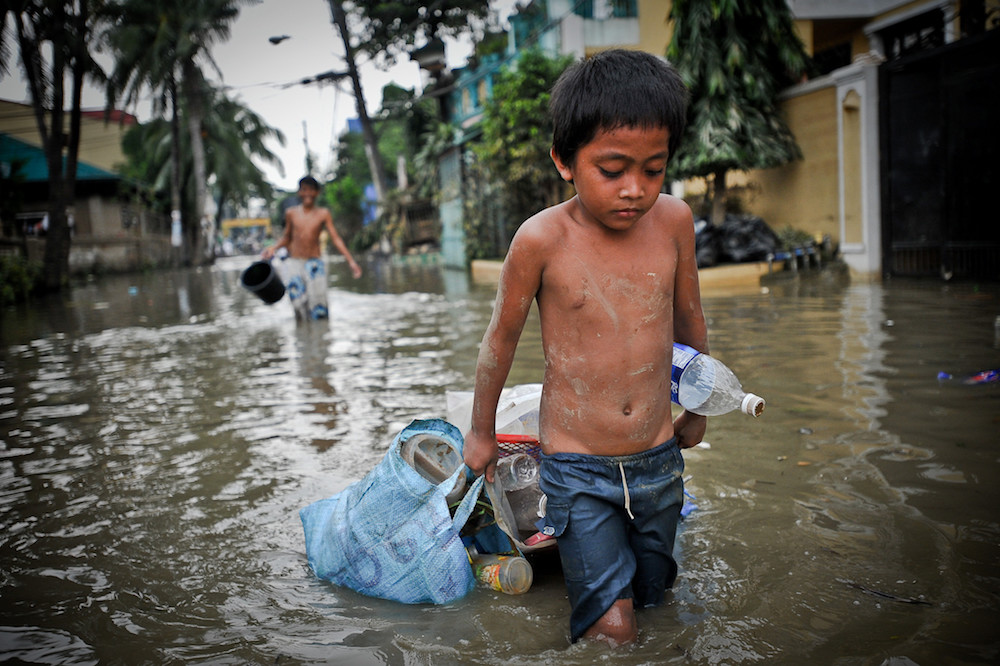By Kert Davies, Climate Investigations Center. Originally posted on Climate Investigations Center.
As climate change liability — who is to blame — increasingly lands in courtrooms around the globe, the Philippines Commission on Human Rights is taking a different and unique approach, investigating climate change impacts as a human rights infringement. The commission has held a series of hearings this year to investigate the role of fossil fuel companies (also known as “carbon majors“) in causing climate change, concealing climate science, delaying policy solutions, and facilitating the climate crisis of the Filipino people.
The most recent session was held in New York City on September 27-28, 2018, bringing together experts from a range of backgrounds including environmental law, human rights law, climate science, and public policy. The next session will be held in London this November.
Notably, no representatives for fossil fuel companies showed up at the New York hearing, though private law firms were apparently present in the audience.
I was invited to present on the growing body of evidence documenting fossil fuel companies’ legacy of climate denial. I presented case studies on the following areas of research:
- What we now know fossil fuel companies knew about climate science decades ago
- What those companies, their trade associations, and front groups did to obstruct climate change policy on the state, federal, and international level
- Evidence that fossil fuel companies paid millions of dollars to surrogate organizations and spokes-scientists to spread climate science denial and misinformation.
Full presentation and follow-up questions from the commission:
Referencing numerous “hard to find” documents now hosted on our Climate Files platform, our presentation covered multiple case studies of recent revelations of fossil fuel companies’ internal scientific investigations of climate change, dating back to the 1980s and beyond.
Documents highlighted in the presentation provided specific evidence of corporate funding of climate denial campaigns and entities that perpetuated climate science disinformation. The presentation outlined coordinated efforts by corporate entities and their trade associations to oppose national greenhouse gas reduction measures and to destabilize the UNFCCC process. It also detailed CIC’s latest research on the increasing funding by ExxonMobil of denial campaigns and organizations from the late 1990s into the mid 2000s, funding which continues to this day.
Despite studying the science internally for decades, deploying their staff scientists to participate in the UN Intergovernmental Panel on Climate Change (IPCC) scientific review process, and presenting internal corporate briefings about the growing scientific consensus, documents show that oil companies were funding organizations saying things they essentially knew were false.
They were also simultaneously funding discredited “contrarian,” “skeptic,” “denier” scientists in order to counter the scientific consensus. For example, we presented a case study of a 1995 document compiled by a Mobil Oil scientist, who knocks down each of the prevailing “contrarian” scientists theories one by one, declaring “they do not offer convincing arguments against the conventional model of greenhouse gas emission-induced climate change.” This was a private document that was never published by the industry group and was later revealed by journalists.
The materials below include a PDF copy of the presentation and a bibliography of documents used in the presentation.
Kert Davies Presentation to the Commission on Human Rights of the Philippines (Text)
Main image: In the aftermath of Typhoon Ketsana (Ondoy), a boy drags some possessions through the flooded streets of Metro Manila in 2009. Credit: Asian Development Bank, CC BY–NC–ND 2.0
Subscribe to our newsletter
Stay up to date with DeSmog news and alerts






